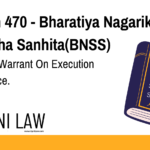Code: Section 74 – Bharatiya Sakshya Adhiniyam, 2023 (BSA)
(1) The following documents are public documents:—
(a) documents forming the acts, or records of the acts—
(i) of the sovereign authority;
(ii) of official bodies and tribunals; and
(iii) of public officers, legislative, judicial and executive of India or of a
foreign country;
(b) public records kept in any State or Union territory of private documents.
(2) All other documents except the documents referred to in sub-section (1) are
private.
Explanation of Section 74 BSA
Section 74 of the Bharatiya Sakshya Adhiniyam (BSA) outlines the classification of documents into public and private categories. This section helps to distinguish between documents that are accessible to the public for various purposes and those that are considered private. The categorization affects how such documents are treated in legal proceedings.
Key Points:
-
Public Documents: The following are considered public documents under Section 74:
-
Sovereign Acts: Documents related to acts of sovereign authority.
-
Official Bodies & Tribunals: Documents formed by official bodies, tribunals, or any institution that holds judicial or administrative powers.
-
Public Officers: Documents produced by public officers, legislative, judicial, or executive authorities of India or foreign countries.
-
Public Records: Public records kept in any State or Union Territory of private documents.
-
-
Private Documents: All other documents, not falling under the definition of public documents, are classified as private documents. These documents are not publicly available unless otherwise specified by law.
-
Impact in Legal Proceedings: The classification between public and private documents can have significant implications in legal proceedings. Public documents are generally admissible without further proof, while private documents may require additional verification and evidence to prove their authenticity.
Illustration
Example:
A court case involves a dispute over land ownership, where one party submits a government-issued land title as evidence. Under Section 74, such a document would be classified as a public document, as it is issued by a public officer. Therefore, it would not require further proof of authenticity in court.
In contrast, a personal contract between two private individuals would be classified as a private document, and its authenticity would need to be proven in court through signatures, witness testimonies, or other evidence.
Common Questions and Answers on Section 74 BSA
-
What are public documents? Public documents include those created by the government, public officers, official bodies, or tribunals. These documents are generally recognized as authentic and do not require further proof.
-
What is the difference between public and private documents? Public documents are those created by authorities such as the government or public officers and are accessible for legal and administrative purposes. Private documents are those created by private individuals and are not automatically available for public use unless specifically authorized by law.
-
Do public documents need to be verified in court? No, public documents are typically accepted as authentic in court without the need for additional proof. Their origin from official bodies or authorities establishes their credibility.
-
How does Section 74 affect legal proceedings? Section 74 helps determine the evidentiary value of documents in court. Public documents are readily admissible, while private documents may require additional proof of authenticity.
Conclusion
Section 74 of the Bharatiya Sakshya Adhiniyam (BSA) plays a vital role in distinguishing between public and private documents. This classification ensures that legal proceedings are streamlined and that public documents are easily accessible and admissible, while private documents undergo appropriate scrutiny to establish their validity.
For further information on public and private documents, or for detailed legal insights, visit ApniLaw.








